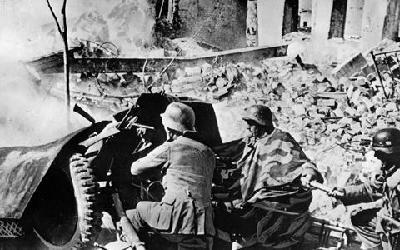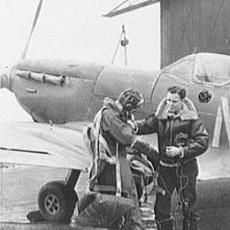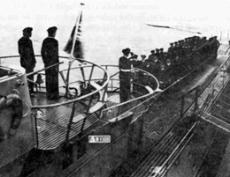
STEVE EMBER: Welcome to THE MAKING OF A NATION – American history in VOA Special English. I'm Steve Ember.
(MUSIC)
In December 1941, the United States was at war.
It declared war against Japan after Japanese planes attacked the American naval base at Pearl Harbor, Hawaii. A few days later, Germany and Italy declared war against the United States.
President Franklin Roosevelt quickly decided that America could not fight major campaigns in the Pacific and in Europe at the same time. He and his advisers decided to fight first against the Germans and Italians. Then, when victory in Europe seemed sure, the United States could turn to fight the Japanese in Asia.
This left the Japanese free to extend their power throughout Asia and the western Pacific. Soon after the attack at Hawaii, Japanese forces invaded Hong Kong, Malaya and the Philippines. American forces in the Philippines suffered heavy losses. And Manila fell to Japanese troops. In February 1942, Japan's forces won a great victory against the British in Singapore.
Japanese forces marched into Burma. They attacked Ceylon -- now Sri Lanka -- and captured the Andaman Islands in the Bay of Bengal. The Japanese military forces seemed too strong to stop.
President Roosevelt sent some forces to the Pacific. And he began to rebuild the American naval forces destroyed at Pearl Harbor. But he sent most of America's military strength to Europe. The United States rushed troops and war equipment to help Britain survive against Adolf Hitler's Germany.
American military leaders wanted to fight Germany quickly by launching an attack across the English Channel. But British Prime Minister Winston Churchill opposed this.
He and others feared such an invasion might fail. So, British and American forces attacked Italian and German occupation troops in North Africa. They defeated them, and then crossed the Mediterranean Sea to attack enemy forces in Sicily. Within weeks, they pushed the Germans out of Sicily to the Italian mainland. The Allied invasion of Italy followed.
Hitler could not strengthen his forces in North Africa and Italy, because Germany also was fighting hard in the Soviet Union.
Hitler's decision early in the war to attack the Soviet Union was a serious mistake. It divided his men and materials. His plan was to defeat Soviet forces quickly with one strong attack. But he failed. And his failure cost him valuable troops and supplies that might have helped him win the battles for North Africa and Italy.
(MUSIC)
Germany's attack on the Soviet Union began with great success.
In the middle of 1941, a German force of more than three million men invaded the Soviet Union. It captured the Ukraine, took control of Kiev, and marched deep into Russia.
The situation changed the following year. Soviet forces under Marshal Georgy Zhukov won a fierce battle for the city of Stalingrad -- now Volgograd. A great many German soldiers died from cold and hunger during the bitter winter months that followed.

(MUSIC)
Zhukov's forces attacked the German troops and pushed back the invaders. Other Soviet troops forced the Germans away from the city of Leningrad -- now St. Petersburg.
By the middle of 1944, German forces throughout the Soviet Union were retreating. And Soviet forces were preparing to push them over the border and invade Germany themselves. The fighting came at a terrible cost. Huge numbers of soldiers and civilians were killed.
(MUSIC)
The fighting in World War Two was not limited to land. Battles were also being fought on the sea. The main goal of the German navy during the war was to prevent the United States from sending ships to Britain with war materials, food and troops. At first, the Germans were very successful. There was hunger in Britain in 1941 because so few ships could cross the North Atlantic with food.
(MUSIC)
German submarines were the greatest danger to ships crossing the Atlantic. These U-boats, as the Germans called them, could hide below the surface and attack without warning.
The threat from German submarines did not ease until new technology was developed in 1943. Allied scientists improved sonar and radar systems that helped find submarines on the surface and underwater. More of the enemy submarines were found and destroyed. The Allies slowly gained control of the Atlantic.
(MUSIC)
Allied and German warships fought a number of traditional naval battles. But airplanes came to play an increasingly important part in the fighting at sea. British ships, with the help of planes launched from an aircraft carrier, destroyed a powerful German battleship, the Bismarck on May 27, 1941.
(MUSIC)
The most famous air battle of the war in Europe took place during the summer and autumn of the previous year. It was known as the Battle of Britain. It got its name from a speech to Parliament by Prime Minister Churchill following the evacuation of British and French forces from Dunkirk.
BBC: "This is the BBC Home Service. Here is the news. In the House of Commons this afternoon, the prime minister, Mr. Churchill, said: 'What General Weygand called the Battle of France is over. The Battle of Britain is about to begin.'"
STEVE EMBER: It was the most extensive aerial bombing yet in the war. It was also the first battle to be fought entirely in the air.
(SOUND)
German Stuka dive-bombers attacked shipping centers, areas of political importance, airfields, and airplane factories.

Luftwaffe pilots in their Messerschmidts battled the Hurricanes and Spitfires of the Royal Air Force. While the flying skills of the German and British pilots were well matched, it was ultimately the greater maneuverability of the British Spitfire that won the long months of battle over the English Channel.
(MUSIC)
The British victory in the air helped prevent "Operation Sea Lion," a planned German invasion of Britain.
In May of 1942, Britain's Royal Air Force carried out an attack on Germany with 1,000 bombers. It was just the first of many bombing runs over Germany and German-occupied areas by the air forces of Britain and the United States.
The planes bombed German military and industrial centers. They also bombed civilian targets in an effort to demonstrate to the German people the price of Germany's aggression. The German cities of Cologne, Dresden and Hamburg suffered widespread destruction. The Allied bombing attacks continued until the war's end in 1945.
Hitler's victories in the early months of the war had struck fear in the hearts of people throughout the world.
Hitler and his Axis allies had won battle after battle. They had captured most of western Europe, and invaded the Soviet Union. They had seized North Africa. And their submarines controlled the Atlantic.

Germany continued to seem strong during the first months after the United States entered the war in Europe. But the situation began to change. German strength and control were greatest in November of 1942. After then, the mighty German military machine began to slow down.
Germany and its Axis partner Italy suffered serious losses in the first six months of 1943.
German losses were extremely heavy in the Soviet Union. One hundred sixty thousand German troops died at Stalingrad, and more than 110,000 surrendered.
American and British forces captured 250,000 German and Italian troops in North Africa. Many more thousands were killed or captured in Sicily and the Italian mainland. German submarines were being destroyed in the North Atlantic, allowing more Allied troops and supplies to reach Britain.
By the end of 1943, Hitler and his armies no longer seemed so strong. But German forces continued to occupy France, Belgium and much of the rest of western Europe. Now, the time had come for the Allies to invade German-held Europe from Britain.
Allied forces planned the greatest military invasion in history to break the German control of Europe and win the war.
US GENERAL DWIGHT EISENHOWER: "People of Western Europe: A landing was made this morning on the coast of France by troops of the Allied Expeditionary Force. This landing is part of a concerted United Nations plan for the liberation of Europe. Although the initial assault may not have been made in your own country, the hour of your liberation is approaching."
(MUSIC)
STEVE EMBER: That invasion -- the famous D-Day landing on the beaches of Normandy -- will be our story next week.
Our program was written by David Jarmul. You can find our series online with transcripts, MP3s, podcasts and pictures at voaspecialenglish.com. You can also follow us on Facebook and Twitter at VOA Learning English. I'm Steve Ember, inviting you to join us again next week for THE MAKING OF A NATION – American history in VOA Special English.
Stuka: a type of German military aircraft designed for dive-bombing, much used in World War II 斯圖卡式俯沖轟炸機
Luftwaffe: the German air force(納粹時代的)德國空軍
American history: US declares war on Japan, Germany and Italy
America history: US-Japan relations before World War Two
American history: Japanese attack on Pearl Harbor pulls US into war
American history: as war in Europe expands, US continues the policy of neutrality
(來源:VOA 編輯:崔旭燕)
